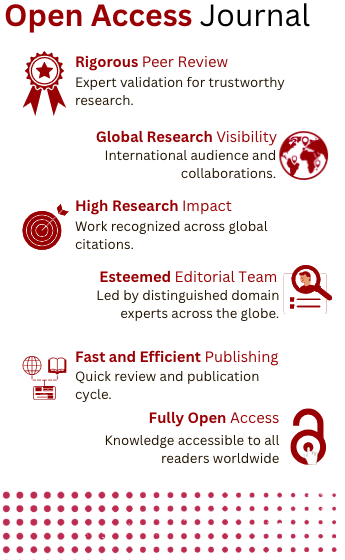Transformer Model to Evaluate Subjective Script
DOI:
https://doi.org/10.5281/zenodo.14557335Keywords:
Positional Encoding, Word vector Embedding, Attention Mechanism, Feed Forward neural networkAbstract
Boards and institutions frequently provide offline subjective exams to a significant student body. It would be highly time-consuming to manually look into such a big volume of papers. There have been initiatives in the past to grade student responses utilising computer science. However, most of these efforts rely on typical counts or particular word counts to achieve the goal. On the contrary, the proposed method employs a Transformer Neural network model is used to process natural language. Components of Transformer model are position encoding, Word vector embedding, Attentionmechanism and Feed forward neural network. Various Natural Language Processing techniques such as Tokenization,Word2Vec, Lemmatization and Semantic Checking.
References
Sriwanna, K. (2018, February). Text classification for subjective scoring using K-nearest neighbors. In 2018 International Conference on Digital Arts, Media and Technology (ICDAMT) (pp. 139-142). IEEE.
Dave, N., Mistry, H., & Verma, J. P. (2017, February). Text data analysis: Computer aided automated assessment system. In 2017 3rd International Conference on Computational Intelligence & Communication Technology (CICT) (pp. 1-4). IEEE.
Hu, X., & Xia, H. (2010, April). Automated assessment system for subjective questions based on LSI. In 2010 Third International Symposium on Intelligent Information Technology and Security Informatics (pp. 250-254). IEEE.
Rosy, S. V. D., Viola, G. V. P., & Sathya, R. (2020). Intelligent short answer assessment using machine learning. International Journal of Engineering and Advanced Technology, 9(4), 1111-1116.
Jain, G., & Lobiyal, D. K. (2017). Conceptual graphs based approach for subjective answers evaluation. International Journal of Conceptual Structures and Smart Applications (IJCSSA), 5(2), 1-21.
Rokade, A., Patil, B., Rajani, S., Revandkar, S., & Shedge, R. (2018, April). Automated grading system using natural language processing. In 2018 Second international conference on inventive communication and computational technologies (ICICCT) (pp. 1123-1127). IEEE.
Johri, E., Dedhia, N., Bohra, K., Chandak, P., & Adhikari, H. (2021, May). ASSESS-Automated Subjective Answer Evaluation Using Semantic Learning. In Proceedings of the 4th International Conference on Advances in Science & Technology (ICAST2021).
Jagadamba, G. (2020, October). Online subjective answer verifying system using artificial intelligence. In 2020 Fourth International Conference on I-SMAC (IoT in Social, Mobile, Analytics and Cloud)(I-SMAC) (pp. 1023-1027). IEEE.
Mandge, V. A., & Thalor, M. A. (2021, March). Revolutionize cosine answer matching technique for question answering system. In 2021 International Conference on Emerging Smart Computing and Informatics (ESCI) (pp. 335-339). IEEE.
Sreedhar Kumar, S., Ahmed, S. T., Mercy Flora, P., Hemanth, L. S., Aishwarya, J., GopalNaik, R., & Fathima, A. (2021, January). An Improved Approach of Unstructured Text Document Classification Using Predetermined Text Model and Probability Technique. In ICASISET 2020: Proceedings of the First International Conference on Advanced Scientific Innovation in Science, Engineering and Technology, ICASISET 2020, 16-17 May 2020, Chennai, India (p. 378). European Alliance for Innovation.
Kumar, S. S., Ahmed, S. T., Xin, Q., Sandeep, S., Madheswaran, M., & Basha, S. M. (2022). Unstructured Oncological Image Cluster Identification Using Improved Unsupervised Clustering Techniques. Computers, Materials & Continua, 72(1).
Ahmed, S. T., & Basha, S. M. (2022). Information and communication theory-source coding techniques-part II. MileStone Research Publications.
Downloads
Published
How to Cite
Issue
Section
License
Copyright (c) 2024 Madhushree, Lavanya N L, Shashi Rekha G, Nagarathna C

This work is licensed under a Creative Commons Attribution-NonCommercial-NoDerivatives 4.0 International License.







